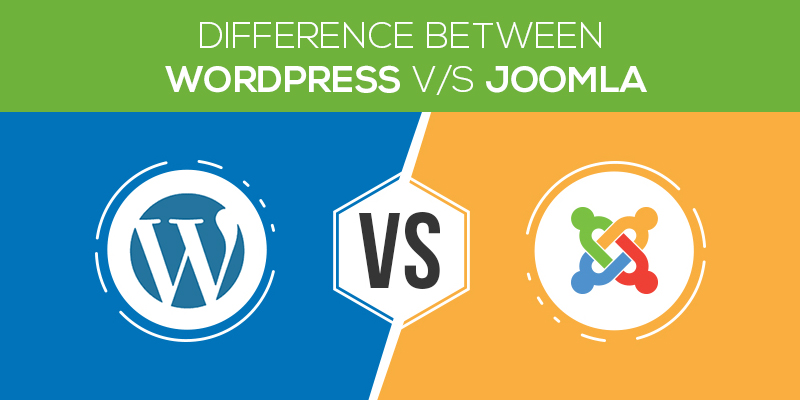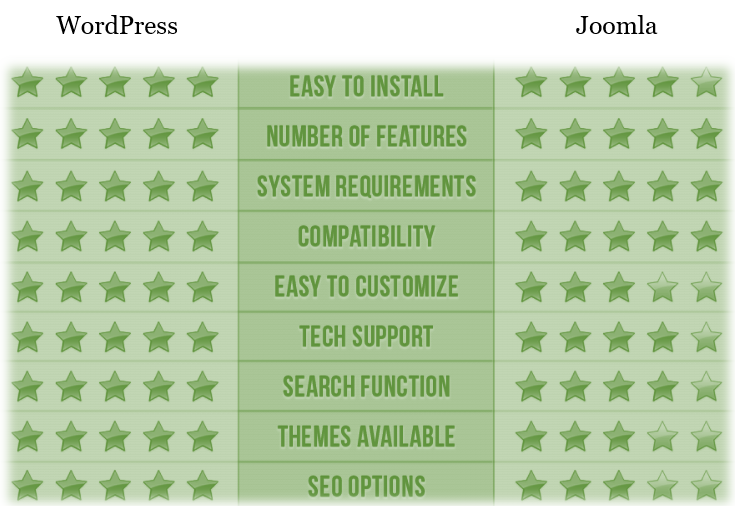
Difference Between WordPress V.s Joomla
Last updated on August 11th, 2021 at 06:13 am
Although many people have a false assumption about the cost and time investment of online marketing, yet if you remain cautious, there will be no need to involve any lengthy timeline, surprise scope creep and endless meetings. All could have been done so easily, just if you could choose the right platform for your site. Here, we have WordPress and Joomla, right now at our hand and we are going to deliver an elaborative insight.
In terms of complexity, there is no doubt that a Joomla site requires a whole lot of technical expertise and investment behind the site architectures. Yet, Joomla sites are more capable and adaptable when we will have to compare it with WordPress. Though, if you are going to boiling down all of the complications and evaporating all of the technical artifacts, at the same time getting a proven result for your web solutions, there is no alternative to WordPress.
WordPress does absolutely fanatic work in terms of simplicity and it understands the business objectives from inside. To craft a beautiful website at the simplest and cheapest manner possible, we do not think there could have been any better solution that WordPress.
Key differences between WordPress and Joomla

A preface to WordPress and Joomla
Being the second most popular content management system on the web. It has been downloaded over 90 million times. The Joomla is completely free and open source CMS to publish any kind of web content with every bit of customization you want for your site. Joomla is written on PHP and it uses object-oriented programming and stores data in MySQL or PostgreSQL. It also consists of flexible features like page caching, RSS feeds, news flashes, search. Blogs as well as supports for languages.
On the other hand, WordPress is also based on PHP and MySQP. Yet it delivers an easier approach to content publishing and content management. The extensions used in WordPress are written in PHP too and the end user does not need to have technical expertise to publish and edit the content, yet the plug-in support and troubleshooting may require professional. The fact is completely reverse while we will be speaking about Joomla. Joomla CMS is also user friendly, yet it may require some sort of technical expertise to handle the site.
An elaborative comparison of WordPress and Joomla
Joomla being the second most popular CMS, it is more or less likely to be a compromised WordPress. It is needless to mention that WordPress is the most used CMS around the world. However, just like WordPress, Joomla has also a wide range of plugins and themes available to choose from. The number of theme and plug ins will be around 6000+ that might certainly add a curry favor to your website pretty quickly. Whether you are going to use WordPress or Joomla, the customization of the look as well as feel of the site will never be a problem. The most significant thing Joomla users love about is that their websites are capable of doing anything and you do not need to sacrifice the ease of use as well. Joomla is basically the concrete combination of power and flexibility.
It is really tough to find out which one is the best, as both could have been nice choices according to the business requirement. They are both outstanding web site builder with brilliant balance of extensions. Any time, plugins and themes could have been used to improve the functionality. The CMS platform of both of them is user friendly, easy and effective. Joomla and WordPress, both are claiming their content management system to be the best. However, according to your business requirement, you will have to choose which one may suit your business the best. Here, we are going to bring forth the CMS features of both of them.
CMS Features
A perfect CMS should different states and properties of the contents like drafts, reviews, editing and publishing. An effective CMS should have the ability to preview any content before publishing. So you could understand what you are going to bringing into the light. Basically, Joomla requires a little bit more technical knowledge than the WordPress. Yet, both of them are capable of handling anything ranging from personal blogs to corporate web portals. However, if we consider the flexibility in terms of dynamicity, Joomla should be considered to be the best. Whether it is a social networking site or an ecommerce site, the flexibility and smoothness of a Joomla site can never be achieved by a WordPress site, no matter what number of plugins you are going to utilize in website.
Final Verdict
Both of them have their ups and downs in terms of feature and flexibility. A newbie can never handle a Joomla site, where he or she may easily tackle one basic WordPress site lacking complicated plug ins. Whether you are a business start-up or a blogger, WordPress will be sufficient for a business website or simple blog. Otherwise, if you want something a bit more complicated in nature like social networking site or ecommerce site, you may prefer Joomla.
Both of them act quite nicely with every kind of website. Yet we have already mentioned that the smoothness of WordPress sites may suffer in case of complicated sites. If you have to use too many complicated plug-ins and if the function of two plugins gets closer. There is always a chance of complication and error message. In this instance, Joomla is more stable, adaptable and flexible. So, should you look for something simple, which you can handle yourself without requiring much technical knowledge, go for the WordPress. If you want the real smoothness and power in the web, you ought to try out the Joomla.

